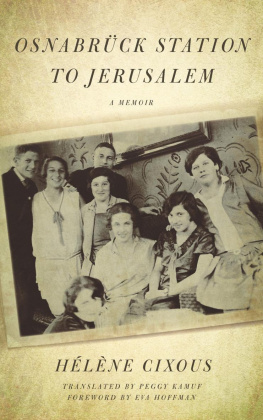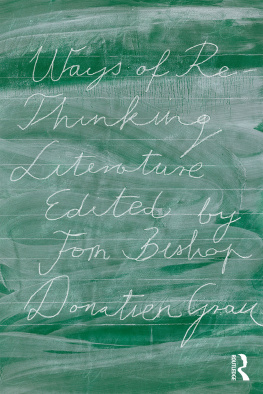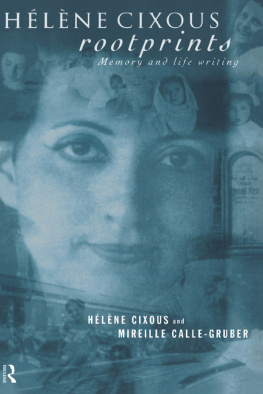Copyright 2020 Fordham University Press
All rights reserved. No part of this publication may be reproduced, stored in a retrieval system, or transmitted in any form or by any meanselectronic, mechanical, photocopy, recording, or any otherexcept for brief quotations in printed reviews, without the prior permission of the publisher.
This book was originally published in French as Hlne Cixous, Gare dOsnabrck Jrusalem: accompagn de sept substantifs dessins par Pierre Alechinsky, copyright ditions Galile, 2016.
This work received the French Voices Award for excellence in publication and translation. French Voices is a program created and funded by the French Embassy in the United States and FACE Foundation. French Voices Logo designed by Serge Bloch.
Fordham University Press has no responsibility for the persistence or accuracy of URLs for external or third-party Internet websites referred to in this publication and does not guarantee that any content on such websites is, or will remain, accurate or appropriate.
Fordham University Press also publishes its books in a variety of electronic formats. Some content that appears in print may not be available in electronic books.
Visit us online at www.fordhampress.com.
Library of Congress Cataloging-in-Publication Data
available online at https://catalog.loc.gov.
Printed in the United States of America
22 21 20 5 4 3 2 1
First edition
All my affectionate gratitude to,
IN OSNABRCK,
Frau Brgermeisterin Karin Jabs-Kiesler,
Andrea Grewe, University of Osnabrck,
Herr Oberbrgermeister Wolfgang Griesert,
Martina Sellmeyer, coauthor of Stationen
auf dem Weg nach Auschwitz,
Martina Dannert, Municipal Library of Osnabrck,
Birgit Kehne, Archives of the Land of Lower Saxony,
IN FRANCE,
Ccile Wajsbrot,
Ins Briard,
Claudia Simma, Annie-Jolle Ripoll, Fatima Zenati,
and, naturally, to my mother ve Klein and
to her sister Erika.
This book owes them more than I could ever say.
Foreword
Eva Hoffman
It could be said that Hlne Cixouss memoir From Osnabrck Station to Jerusalem belongs to the genre of second-generation return memoirs, recounting journeys by descendants of Holocaust victims to places where family members lived before the cataclysm. But in this rigorously reflective as well as intimately personal book, Cixous complicates and deconstructs (the word in this case is entirely appropriate) the very idea of such a return. Rather than giving us a factual chronicle of a geographic journey to a place where ones ancestors lived and died, Cixouss memoir is an attempt to understand how such a legacy lives in the descendants imagination, and to decode the processes and possibilitiesas well as the impossibilityof reaching and recapturing a disappeared past.
Cixous herself grew up in Oran, Algeria, where her mother and grandmother arrived in the 1930s from the German town of Osnabrck, which before World War II held a small Jewish population but which since then has been entirely devoid of Jewish inhabitants. Through fragmentary, often lyrical recollections, we learn that as a child, Hlne loved the sound of German language and inherited her relatives admiration for German literature. She eagerly absorbed her mothers stories of growing up quite happily in a charming, unpretentious town and admired that light dusting of amusement that Maman sprinkled over tragedy. The first part of the memoir can be read as a moving homage to Cixouss mother and an attempt to keep her much-loved presence alive in memory and in the present. She was everywhere, Cixous asserts after her death at the great age of 103suggesting how deeply she continues to permeate the daughters psyche and imagination.
Osnabrck itself, through seventy years of Homeric stories proffered by my mother, becomes a kind of Ithaca or Jerusalema mythical place of origin from which one has been exiled and which one must never forget. But going there in reality is fraught with ambivalence. Cixous wants and doesnt want to go. She feels regret about not going earlier and resists the collision between the Osnabrck of her imagination and the present-day reality. Her prose, particularly in the first part of the memoir, has the rhythms of approach and retreat, of fear and desire, of hypnotic repetitions and incantatory refrains.
When she finally does make the journey to the actual Osnabrck, she finds a pleasant, historic town where she is warmly welcomed by an affable Oberbrgermeister, or mayor, and a feminist Brgermeisterin who is a recognizable, even a kindred contemporary figure. But she also discovers how much she didnt know of what actually happened behind this innocent faade during the worst of times and how many disturbing family stories were concealed, under the tender and amoral protection of secrecy, within her mothers and other relatives recollections.
Family silences are a familiar trope in second-generation stories, often exercising a disturbing force on the descendants through the very absence of knowledge. But again, Cixous wants to go below and beyond the facts to understand what they conceal and reveal. In her Preface, she makes a distinction between the abstractions of globalized great History and the great little singular tragedies it obscures from view; and the second part of the book is a meditation on the movements and meaningsas well as the terrible ambiguitiesof actual history. History begins before it becomes History, she writes, noting that the signs and portents of antisemitic hatred that eventually turned to murderous antisemitism were already there in 1930, or even in 1923; and one of the questions that haunt the second part of her memoir is why some people read the signs and left in time to save themselves while others stayed to meet their terrible fates.
The main person through whom this question is investigated is the tragic figure of Uncle Andr, or Onkel Andrthe King Lear of Osnabrckwho went to Palestine in the hopes of joining his daughter and her husband, only to return soon after in a state of melancholic indifference and resignation. The terrible secret hidden within these factsworthy of the Shakespearean comparison, and the allusions to Job that punctuate his storywas that Onkel Andrs daughter refused to shelter him, declaring that old people were not needed in Palestine: a cruel rejection that eventually led to his deportation to Auschwitz.
There are other stories of particular people, and other family secrets, almost literally unspeakable. But Osnabrck also holds more concrete evidence of and clues to the collective past. Cixous discovers a Judenhaus, never mentioned in her relatives stories, in which Jews were gathered before being put on a train to Auschwitz. She walks on so-called stumbling stones, inserted into the sidewalk and bearing names of the deada poignant form of memorial adopted in many German towns. Most of all, she studies the Book, published long after, and recording the fates of Osnabrcks Jews. She looks at travel permits and other documents that speak of appalling persecutions and increasing restrictions on Jewish lives and movements.
She also discovers a surprising document, listing offers of jobs on several continents, extended through a charitable organization to Jewish professionals and workers at all levels; and she wonders why some people took up such possibilities eagerly, while others refused to contemplate them. In retrospect, the right decisions in such cases seem perfectly obvious; but Cixous tries to understand them from the perspective beforereflecting on the strangeness of having to choose among a superabundance of potential lives and identities. This was especially true, she speculates, for those who felt that their identity was not only Jewish, but firmly German. Indeed, she discovers a photo of Onkel Andr with several Jewish friends, and she notes that they were recognizably modern men, respectably dressed, and indistinguishable from other Germans. This, ironically, made them, in the eyes of hate-filled antisemites, only more insidiously dangerousbut perhaps that is another kind of perception available only in hindsight.










